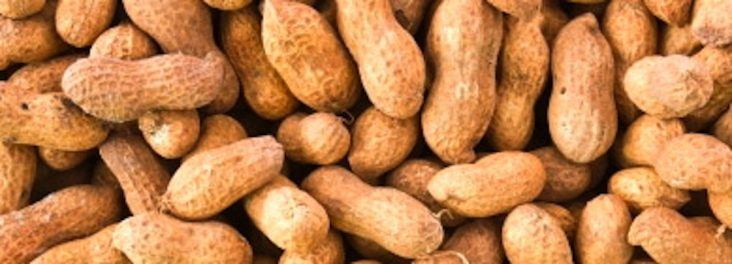Arkansas peanut acres, yields increase in 2020
by February 9, 2021 9:05 am 1,113 views

One of the Natural State’s newest former crops, peanuts, had a banner year in 2020 despite weather problems and a partial re-plant. A couple of new buying points helped streamline the harvest process, said Andy Vangilder, an extension educator for the University of Arkansas System Division of Agriculture.
The season was also marked by peanuts’ expansion out of northeastern and east central Arkansas, adding interest and at least one major grower in the state.
“Early season weather allowed growers to get in the field and some took the risk and planted early,” Vangilder said. “Then, however, the rains came. Wet and cool weather followed, forcing some to add more seed in the field and some replanted together. I would say 10 to 15% had to replant.”
Arkansas planted around 37,000 acres in peanuts in 2020, up from 2019’s 33,000. Top counties for peanut production in 2020 were Chicot, Clay, Craighead, Greene, Lawrence, Lee, Mississippi, Phillips, Poinsett, Randolph and St. Francis.
It appeared yields might be down when harvest began. By the end of the season, Arkansas peanut farmers had the highest yields in the country, Arkansas Agriculture Secretary Wes Ward told Talk Business & Politics.
“Those first peanuts didn’t really grow off well. They had thin stands and didn’t have the best yield potential,” Vangilder said. “The first yields came in at around 4,000 to 4,500 pounds per acre and steadily increased to the 5,500-pounds-per-acre-and-better range.”
Ward believes peanuts will continue to be a viable crop in the Delta after it was reintroduced into the region following test plots planted during the 2010 growing season. Peanut companies started to look for new places to grow peanuts as irrigation became more difficult in places such as Georgia, Oklahoma, and Texas.
Northeast Arkansas has places with rich sandy soil that are ideal for growing peanuts and it has a stable water supply. The only problem is the region’s climate is on the borderline for temperature and weather changes that can impact peanut harvest at the end of the season.
Peanuts had been grown in Northeast Arkansas on a small scale for several generations dating back more than 100 years, but farmers stopped planting the legume in the late 1970s.
New buying points at Jonesboro and Marianna, plus the already existing points at Pocahontas and Portia, sped the harvest from field to warehouse, Vangilder said. There were not long lines for trucks and it allowed producers to harvest on their own schedules, he added. Vangilder said there were four new growers in Clay County in 2020, and one new grower in Chicot County.
“I visited with several producers down around Tillar who are considering growing peanuts,” he said. “They’re watching to see how the crop there goes.”
Because peanuts are not a friendly crop to the nematodes that plague cotton, rotating the legume has proven a boon for cotton growers. Vangilder said 2020 had another upside. This year he was able to get peanut trials off the ground.
“We focused on three areas: variety testing, plant growth regulators and incorporating gypsum,” he said. “Gypsum applied to the soil provides needed calcium to peanut plants.”
Travis Faske, extension plant pathologist, has been conducting small block trials. Faske doubled as an extension resource for peanut growers for several years before Vangilder returned to the Cooperative Extension Service, which was able to conduct several large block trials this past growing season.
As trials expanded across different counties, so did the knowledge base of county agents. He said he appreciated working with Mike Andrews in Randolph County, Bryce Baldridge and Courteney Sisk in Lawrence County, Chris Grimes in Craighead County and Allison Howell in Clay County.
“Everything you do with peanuts is slow. Planting. Digging. Slow harvest,” he said. “You can run 5 to 8 miles per hour to combine beans. It’s more like 0.8 to 1.6 miles per hour for peanuts.”
Research was aided by the purchase of a weigh wagon for the 2020 season to help gauge yields, as well as funding from the Arkansas Peanut Board for research into weed, insect and disease pests.
Vangilder expressed some disappointment about variety trials in 2020.
“While we were able to have variety tests in the high oleic varieties, I was disappointed not to be able to get seed to have a standard variety test especially having a grower wanting to do the test,” he said.
The trials are important to producers because they can show which varieties are best suited for Arkansas’ growing conditions.
“It’s hard to have a variety trial with just one variety,” he said, adding that he hoped the seed situation might be better for 2021.
